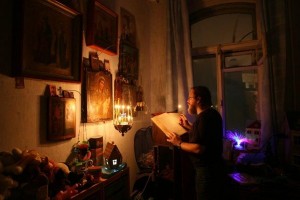25 February OS 2016 – Wednesday of Cheesefare Week; St. Tarasios of Constantinople
At the Sixth Hour today, we hear the first Old Testament reading from the Triodion, Joel 2: 12-26. St. Theophan the Recluse selects verses 12 to 17 for his commentary:
Therefore also now, saith the LORD, turn ye even to me with all your heart, and with fasting, and with weeping, and with mourning: And rend your heart, and not your garments, and turn unto the LORD your God: for he is gracious and merciful, slow to anger, and of great kindness, and repenteth him of the evil.
Who knoweth if he will return and repent, and leave a blessing behind him; even a meat offering and a drink offering unto the LORD your God? Blow the trumpet in Zion, sanctify a fast, call a solemn assembly: Gather the people, sanctify the congregation, assemble the elders, gather the children, and those that suck the breasts: let the bridegroom go forth of his chamber, and the bride out of her closet. Let the priests, the ministers of the LORD, weep between the porch and the altar, and let them say, Spare thy people, O LORD, and give not thine heritage to reproach, that the heathen should rule over them: wherefore should they say among the people, Where is their God?
St. Theophan writes,
Who now hearkens unto this voice, resounding in the Church? If on the city squares a thunderous voice should resound from heaven, saying, “Spare yourselves, O people, so that the Lord will spare you!” – perhaps someone would hear it and awake from his ecstasy of pleasures, lusts, and wine. The priests do not cease to plead, “Spare us, O Lord!” But from the Lord comes the just yet terrible answer, “I will not spare, for there are none seeking to be spared.” All are standing with their backs to the Lord; they have turned from Him and forgotten Him. – Thoughts for Each Day of the Year, p. 51
This judgment may seem severe to us, and yet we know from the life and letters of Theophan the Recluse that he was not a harsh or fanatical religious figure, quite the contrary. He is speaking here not from passionate anger but from pain of heart. In his time, in Russia, there were thousands of churches, hundreds of monasteries, and abundant opportunities for people to learn and practice the Orthodox Faith. There was a minority seeking genuine spiritual life. But the vast majority of the country’s leadership, and a critical mass of its ordinary people, had settled into an external, perfunctory performance of their religious duties masking either outright unbelief (in the case of the educated classes) or pagan superstition (in the case of the peasants). These were the spiritual conditions that prepared the way for the satanic Bolshevik revolution of 1917.
Though we do not live in an Orthodox society, much is still given us. We have abundant Orthodox literature now in English. Even though we may not have a parish near us, or our parish has a very limited liturgical schedule, we can learn to read services at home. Though we may be physically isolated, we providentially have convenient means to correspond and converse with our father confessor and like-minded Orthodox friends. We can carry our prayer rope, say the Jesus Prayer as much as possible, and constantly ponder on death and God’s judgment. Though non-Orthodox people surround us, we can practice our Faith among them by praying for them and by praying the Lord to send into our lives people whose hearts are open to Him. Despite all of America’s problems, it is providentially a land where we now have the freedom to educate our children as we see fit. And we have before our eyes, thanks to communication technology, the spectacle of the entire confused and suffering world, the results of the terrible apostasy lamented by St. Theophan that occurred not only in Russia but also throughout the Orthodox world. We have all the written, audio-recorded, and photographic historical testimony needed to understand our true situation and how we got into this mess. We should be highly motivated to get out.
Let us therefore rend our hearts and not our garments (though, frankly, some garment rending would not be out of order as well), and turn to the Lord our God. In the few days left before Great Lent begins, let us set aside some time to ponder on our spiritual state, examine honestly the way we conduct our daily lives at home and at work, and make a firm resolution to stick to a daily routine of prayer and spiritual reading. Every Great Lent, every Holy Week, every Pascha, may be our last. Now is the acceptable time. Now is the day of our salvation.
Καλή Σαρακοστή! A blessed Forty Days to all!

